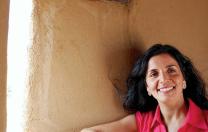“There’s actually been no institutional relationship between personal healing and social justice,” says professor of psychiatry Richard Mollica, M.D., director of the Harvard Program on Refugee Trauma (HPRT) at Massachusetts General Hospital. “For example, look at the experiences of witnesses in the Bosnian tribunal at The Hague: it’s very clear that many did not experience social justice as therapeutic.” South Africa’s Truth and Reconciliation Commission set several goals, including apology, punishment, compensation, and reconciliation, but its chair, Archbishop Desmond Tutu, LL.D. ’79, clearly stated that the commission would not be able to heal most victims of the atrocities of apartheid.
Mollica has spent more than 30 years helping victims of many kinds of trauma around the world. His recent book, Healing Invisible Wounds: Paths to Hope and Recovery in a Violent World, argues that people have an inherent ability to heal themselves and focuses on the relationship between personal healing and the healing of collective wounds—which may or may not include the legal and institutional remedies that are aspects of social justice. Mollica and his colleagues at HPRT have developed a global training for post-conflict recovery, and set up an on-line global dialogue on the prevention of all forms of human violence (see their blog: healinginvisiblewounds.typepad.com).
No society has a good definition of social healing, Mollica says, and ironically, social justice—prosecuting perpetrators of crimes against humanity, for example—“can actually make the individual and/or the situation worse for the survivors of violent crimes. Look at the aftermath of acquittals in The Hague—people felt betrayed, and felt that their ongoing social and economic crises were not addressed. Many survivors felt the courts were primarily politically motivated.” Furthermore, “A lot of people were destroyed or psychologically damaged by giving or hearing testimony at the international tribunal,” he says. “It is traumatic in itself for a South African mother to learn via testimony that her son was barbecued by police agents.” Yet vivid testimony of this kind strengthens the prosecutors’ case, Mollica says. “The more vivid it is, the more injured the victim is, the more it helps the prosecutors.”
Though he believes that social justice can contribute to the healing process, Mollica points out that “there is such a thing as a toxic trauma story. Telling the brutal facts that generate high emotions can be very negative and anti-therapeutic. A trauma story needs to be associated with survival and healing—then it becomes a teaching story, as in the lives of Gandhi, Martin Luther King, and ordinary survivors as well. Societies need to collect and share these stories. We’re not doing a good job of this internationally, or with the people of New Orleans or Iraq, or soldiers returning from the Iraq War. We don’t have good personal data from Native Americans on their personal reactions to the ethnic cleansings they experienced. Stories like this can help both social healing and personal healing.”







